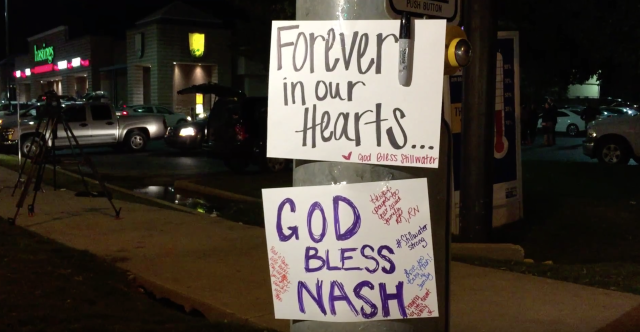The day before Thanksgiving, Stillwater Medical Center announced via press release that it will not bill patients who received care as a result of the Oct. 24 OSU homecoming tragedy.
But, like many things in health care, unpacking the financial practices of hospitals and health insurers can prove incredibly complicated.
“They’re not logical at all, the billing practices,” said Wendell Potter, a former health insurance executive turned industry critic. “And it’s because we’ve got this convoluted, multi-payer system in this country. Every payer — whether it’s the government through Medicare and Medicaid or the Children’s Health Insurance Plan, or the many different private health insurance companies — they all pay different amounts for the exact same procedures or services, and all of this is done very secretively.”
According to Stillwater Medical Center Chief Financial Officer Alan Lovelace, the convoluted nature of seeking reimbursement from health insurers was a driving factor in the hospital board’s decision not to bill patients directly.
In addition, Lovelace told NonDoc Tuesday that the hospital will not bill health insurance for the tragedy victims either, unless they specifically request it. One patient has, he said.
Lovelace, who has been at SMC for five years, repeatedly referenced a “hassle” and a “burden” that patients would have faced if their health insurances had been billed
“If we would have billed the (health) insurance company, (patients) would have got a letter from their insurance company basically wanting to know what happened, and they would have had to explain it,” Lovelace said. “And how these third-party claims work out is that they could be getting letters periodically for years to come trying to figure out who is responsible for this bill.
“We just didn’t want those patients to have to deal with that for the current moment and for the inevitable future that would definitely be coming their way.”
‘It would be a long process’
Hospital spokeswoman Shyla Eggers emphasized that she could not speak to specific insurance policies, but she added perspective for how the process likely would have unfolded for Stillwater Medical Center patients.
“I’m not a claims expert,” Eggers said. “I can just say what I’ve heard here and there is that the very first thing a health insurance company is going to do is say, ‘We’re not responsible. Her automobile insurance is responsible. That young lady (who drove into the crowd) is responsible for these injuries. We’re not going to pay this until all other processes of responsibility have been looked at.’
“It would be a long process and a waterfall almost of trying to get payment, and just imagine what the patients would be dealing with as far as paperwork and out-of-pocket (costs).”
Follow NonDoc:
While patients and insurers are both happy that the hospital may ultimately write off about $204,000 in charges that it could have billed, the situation raises a myriad of questions about how the health insurance and hospital industries interact.
Industry critic Potter took aim at the efficacy of “high-deductible” insurance plans.
“One way that employers and insurers are able to keep up with medical inflation and to profit is to shift more and more of the cost of care to individual families and workers,” Potter said.
A deductible refers to a set dollar amount that patients must pay out of pocket before health insurance kicks in and begins covering bills.
Potter, who worked in health insurance as vice president of corporate communications for Cigna for 19 years prior to resigning in 2008, said the industry made a conscious decision to begin shifting Americans into high-deductible plans years ago, well before the Affordable Care Act.
“It’s a trend that the insurance industry started while I was still in the industry, and it’s one of the reasons I left,” Potter said. “Because I knew that these plans are not good for people on low and moderate incomes, and that’s most of us, quite frankly, in this country.”
From high deductibles to ‘bad debt’
Potter said the Affordable Care Act locked in place a private health insurance model that has pushed deductibles higher.
“One of the things that has developed as a consequence of more people being in high deductible plans is that we’re seeing a resurgence in ‘bad debt’ — people are not able to pay for their hospital care, and hospitals are being more aggressive across the country in trying to collect these payments of what is supposedly due. It’s putting a lot of financial stress on people who, in the past, might have seen some of their bills go away. Now, more and more hospitals are going after them pretty aggressively.”
That’s something Lovelace said Stillwater Medical Center did not want to do regarding patient bills from the Stillwater tragedy.
“It was basically unanimous among the team that we don’t want these people to be burdened with the memory of this, with dealing with the insurance hassle that they would undoubtedly deal with if we did bill their insurance,” Lovelace said.
And he agreed with Potter about rising amounts of “bad debt” facing hospitals, partially as a result of high-deductible insurance plans.
“Being a college town, we have lots of motor vehicle accidents here,” Lovelace said. “We have lots of dollars on the books that are very, very, very old that go with motor vehicle accidents, so we have lots of experience in that.”
The hospital CFO provided a rundown of how billing can go for patients who are uninsured or underinsured (meaning their deductibles and out-of-pocket contractual percentages leave them with hefty tabs).
“They’ll get statements, they’ll get phone calls from us trying to collect that deductible, and then in a certain amount of time, we’ll turn that over to a collection agency, and then if they’re not able to collect it in a certain amount of time, then it’s written off as bad debt,” Lovelace said. “And if we have so much bad debt that we can’t keep our doors open, then yeah, eventually that affects the care of all patients in the community. But we’re not to that point.”
Indeed, the Stillwater Medical Center was in good enough financial shape to write off $200,000 worth of victims’ bills through what Lovelace called “an administrative adjustment,” though he said SMC usually receives $0.50 on the $1 it bills to insurers.
“So we pretty much left about $100,000 on the table,” Lovelace said. “We knew that, but we felt that $100,000 that we left on the table was our contribution — in addition to the great care that we gave those patients — to those families for them not to have to deal with the hassle that would go along with if we did bill their insurance companies.”
Complications ‘right off the bat’
Collett Campbell’s 12-year-old son, Alleyn, was injured and hospitalized as a result of the Oct. 24 wreck. Campbell and her husband offered great appreciation for Stillwater Medical Center’s care and its decision to avoid billing patients.
The Campbell’s said they have a $6,000 family deductible, and they spoke critically of health insurers from personal and professional experiences.
“Insurance plays insurance games,” said Collett Campbell, whose son sustained a broken leg and a shoulder injury while watching the Homecoming parade. “The first thing we found is when my husband went to go get the wheelchair for our son, our health insurance said, ‘Oh whoa, this isn’t us.’ That was right off the bat. Like, ‘Nobody’s put in a pre-authorization for this. We can’t authorize this.’ So, I mean, we’re trying to get a wheelchair two days later and we’re told, ‘You’re not having us pay for it.’”
Collett Campbell’s husband, Maury, is a pharmacist and said health insurers have so much lobbying power with Congress that fixing America’s health insurance system is nearly impossible.
“You would have to have a magic wand because it’s going to take total overhaul of the industry,” Maury Campbell said. “I see more from the pharmacy side. Pharmacists have no say-so, no negotiation. It’s take-it-or-leave-it contracts.”
The Campbells said they expect to file health insurance claims for their son’s durable medical equipment and physical therapy as his recovery moves forward.
But while their health insurance won’t be billed by Stillwater Medical Center for their son’s hospital stay, Maury Campbell said he received notice that his auto insurance has already paid a claim on medical care, presumably to the hospital.
“I know it was the hospital because they used a company,” Campbell said. “Any time an auto is involved, there’s a company called RevClaims, and that’s the paperwork they handed out to everybody in the emergency room — RevClaims. They asked everybody to fill it out, and we never did, but that’s whose name showed up on the bill for the auto (insurance). (It) was RevClaims.”
Mr. Campbell said the claim was about $18,000, and he emphasized that he has no problem with the hospital seeking reimbursement from any insurance source.
“We do like our hospital, and they do an awesome job, as far as I’m concerned,” he said.
In the hospital’s original press release about not billing patients, CEO Jerry Moeller said, “We will file a claim through the automobile claims process and accept any liability funds available as payment in full.”
NonDoc reached out to Blue Cross Blue Shield of Oklahoma and the Oklahoma Insurance Department, but a call was not returned from OID and people familiar with BCBS’s subrogation process were not available for comment.
Collett Campbell, who works as a pedorthist, explained the process as someone who has dealt with insurance companies as a patient and a provider.
“Typically what happens is, by the time insurance goes through all the other places to try to pay, then, in the meantime, you’re getting medical bills and you either have to pay it up front and hope you’re going to get reimbursed, or you are just kind of stuck in the middle,” she said. “Anymore, my opinion of insurance is you have insurance for that catastrophe — for that person who goes to the hospital in critical condition that their bill is going to be $100,000-plus, and you go, ‘Whew, all I’ve got to do is pay $6,000 of it, and we’re going to be OK.'”
Potter, the former insurance executive, agreed and said the complexities of health care financials can make people cynical, something likely exacerbated by a hospital ultimately billing auto insurance instead of health insurance to help cover the costs of treating patients injured in a community tragedy.
“It’s an unbelievably complex health care system that we have,” Potter said. “No other system in the world is like ours. No other system is nearly this complex or this expensive, and part of the reason for it is there is so little transparency, and the bizarre way that hospitals are compensated for the services they provide.”






















